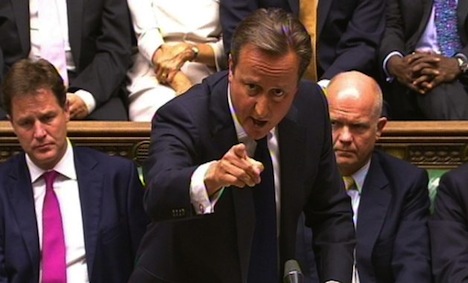The joint US and European will to respond to last Wednesday’s chemical attack on the eastern outskirts of Damascus has received a blow after the British House of Commons voted narrowly 283 to 272 against a resolution that would have provisionally authorized British military intervention in Syria — a staggeringly rare defeat for a British government on a matter of foreign policy.![]()
![]()
![]()
The vote comes as a blow not only to UK prime minister David Cameron, who suffered defections from nearly three dozen skeptical Conservatives as well as additional Liberal Democratic members of his own governing coalition, but also interventionists in the United States who are urging US president Barack Obama to launch an aggressive attack on the regime of Syrian president Bashar al-Assad. It is very unlikely that the United States would proceed with unilateral military action without British support, which is unlikely to come anytime soon in light of Cameron pledge to respect the parliamentary decision:
I can give that assurance. Let me say, the House has not voted for either motion tonight. I strongly believe in the need for a tough response to the use of chemical weapons, but I also believe in respecting the will of this House of Commons. It is very clear tonight that, while the House has not passed a motion, it is clear to me that the British parliament, reflecting the views of the British people, does not want to see British military action. I get that and the government will act accordingly.
It’s a vote that has the potential to turn the US-UK relationship upside down, to turn Middle Eastern realpolitik upside down, to turn British politics upside down and even to turn US politics upside down. For a sitting prime minister to lose a vote like this is a huge reversal in the relationship between an ever-more powerful British executive and an ever-more feeble parliament on issues like security policy and foreign affairs.
Most immediately, it means that a U.S.-led missile strike, which seemed imminent yesterday, will now be postponed until early next week, at the earliest, when chemical weapons inspectors from the United Nations have had an opportunity to provide their initial assessment of what happened in Ghouta and eastern Damascus. The vote also comes after several news organizations reported that U.S. and allied intelligence agencies are assured that while the chemical attack came from pro-Assad forces, they are uncertain who ordered the attack amid indications that Assad and his top military brass were caught unaware. Meanwhile, French president François Hollande has backed off earlier, more urgent calls for military action.
Cameron’s massive defeat does not necessarily preclude a vote next week after the United Nations reports back as to which party — and which chemical agent — is to blame for the horrific Damascus attack. If the UN report, together with US and European intelligence, all points to Assad’s culpability, Cameron and Obama will have a much stronger case for an aggressive response, either inside or outside the United Nations Security Council.
Meanwhile, the vote is perhaps the largest political victory in Ed Miliband’s three-year tenure as leader of the Labour Party. Miliband firmly opposed the resolution even after Cameron offered to submit to a second vote before authorizing military action, making today’s resolution essentially a vote for the principle of the British government’s potential military intervention. The vote capped a tumultuous 24 hours in Westminster, with Cameron’s allies accusing Miliband of giving ‘succour’ to the Assad regime, which probably didn’t make it likelier that Labour would close ranks with the Tories over a potential Syria intervention. It was a principled stand for Miliband and, though he’s closer to British public opinion on Syria than Cameron, it was also a courageous stand for a young opposition leader to oppose a sitting government on such a crucial matter of foreign policy.
Miliband’s line boils down to one sentence from his statement earlier today: ‘Evidence should precede decision not decision precede evidence’: Continue reading Cameron loses House of Commons vote on Syria military intervention

